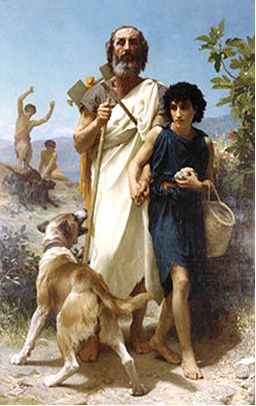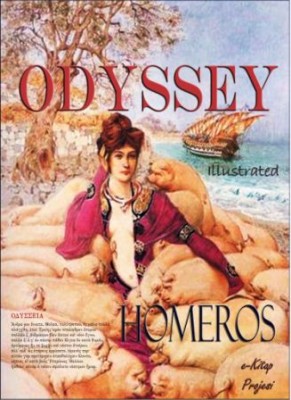More Search Results...

“Homer” is a Greek name, attested in Aeolic-speaking areas, and although nothing definite is known about him, traditions arose purporting to give details of his birthplace and background. The satirist Lucian, in his True History, describes him as a Babylonian called Tigranes, who assumed the name Homer when taken “hostage” (homeros) by the Greeks. When the Emperor Hadrian asked the Oracle at Delphi about Homer, the Pythia proclaimed that he was Ithacan, the son of Epikaste and Telemachus, from the Odyssey.
These stories were incorporated into the various Lives of Homer compiled from the Alexandrian period onwards. Homer is most frequently said to be born in the Ionian region of Asia Minor, at Smyrna, or on the island of Chios, dying on the Cycladic island of Ios. A connection with Smyrna seems to be alluded to in a legend that his original name was Melesigenes (“born of Meles”, a river which flowed by that city), and his mother the nymph Kretheis. Internal evidence from the poems gives evidence of familiarity with the topography and place-names of this area of Asia Minor; for example, Homer refers to meadow birds at the mouth of the Caystros, a storm in the Icarian sea, and mentions that women in Maeonia and Caria stain ivory with scarlet.
The association with Chios dates back to at least Semonides of Amorgos, who cited a famous line in the Iliad (6.146) as by “the man of Chios”. An eponymous bardic guild, known as the Homeridae (sons of Homer), or Homeristae (‘Homerizers’) appears to have existed there, tracing descent from an ancestor of that name, or upholding their function as rhapsodes or “lay-stitchers” specialising in the recitation of Homeric poetry. Wilhelm Dörpfeld suggests that Homer had visited many of the places and regions which he describes in his epics, such as Mycenae, Troy, the palace of Odysseus at Ithaca and more. According to Diodorus Siculus, Homer had even visited Egypt.
Odyssey
The Odyssey begins ten years after the end of the ten-year Trojan War (that is the subject of the Iliad), and Odysseus has still not returned home from the war. Odysseus' son Telemachus is about 20 years old and is sharing his absent father’s house on the island of Ithaca with his mother Penelope and a crowd of 108 boisterous young men, "the Suitors", whose aim is to persuade Penelope to marry one of them, all the while enjoying the hospitality of Odysseus' household and eating up his wealth. Odysseus’ protectress, the goddess Athena, discusses his fate with Zeus, king of the gods, at a moment when Odysseus' enemy, the god of the sea Poseidon, is absent from Mount Olympus. Then, disguised as a Taphian chieftain named Mentes, she visits Telemachus to urge him to search for news of his father. He offers her hospitality; they observe the Suitors dining rowdily while the bard Phemius performs a narrative poem for them. Penelope objects to Phemius' theme, the "Return from Troy".
More info →
































